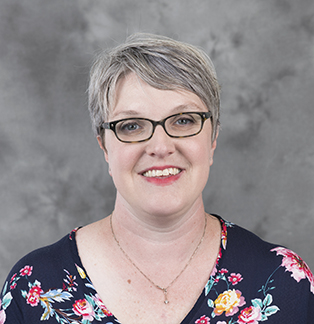Dr. LaVerene Garner worked in outpatient orthopedics for many years as a physical therapist. When she moved on base at Camp Lejeune to work with veterans who had suffered concussions in Afghanistan and Iraq, she learned an important lesson about healing.
“I got to see how when we provide care in silos — when healthcare providers don’t talk to each other — our patients are negatively impacted by that, versus when we understand each other, people get better,” she says. “In order to heal any kind of injury, we (healthcare providers) have to understand each other.”
Her search for that understanding and how to better implement interdisciplinary work led her to UNC Greensboro’s online Ed.D. in Kinesiology program.
Interdisciplinary Impact
Now in her second year, LaVerene says the program’s interdisciplinary approach has a big impact on her learning and growth in the physical therapy field.
“One of the things that I think is helpful to physical therapists overall is to understand how we fit within the entire spectrum of wellness, as a whole,” she says.
In the program she’s worked with physical education teachers, exercise physiologists, and others, learning more about what they do. Being exposed to classmates and professors from those different backgrounds in an interdisciplinary way proved beneficial.
“I think that there’s great benefit in that because as physical therapists, we’re typically working with people when they’re sick or injured, and so we don’t focus on the wellness part, which is something we’re kind of headed towards as a profession,” she says. “I think the interdisciplinary component of the program really helps foster interdisciplinary relationships, understanding, and respect.”
The program also helps LaVerene grow in her role as assistant clinical professor in Winston-Salem State University’s DPT program. For example, taking graduate courses that were intentionally designed to be online helped her pivot to virtual instruction with her students when the pandemic caused shutdowns last spring.
“Because I’m in an online program and I see people delivering material so well, it really challenged me to reconsider and reconceptualize the way that I educate students. And I know my students, many of them have said, I really prefer lecture in an online way because I can interact with the information when my brain is fresh,” she says.
A Good Fit for Her Field
LaVerene is currently the only physical therapist in her cohort, but there are others in the program. As a physical therapy educator, she wanted to improve her research and teaching.
“I think overall I have some pretty big goals of helping to support future professionals through my research,” she says.
For clinicians interested in going into education, this program allows them to improve their education in ways that weren’t necessarily in the entry-level PT curriculum.
“It was really the sports psychology expertise that attracted me to this program because that’s a deficiency that I have and I think we have as physical therapists,” she says.
A Holistic Approach to Research
LaVerene didn’t start out with an Ed.D. program in mind. Initially, she looked for a Ph.D. program where she could continue her work with people post-concussion and add to her DPT credentials, but she couldn’t find one that embraced who she was and what she wanted to do.
“A Ph.D. really offers us the ability to look in depth at one focal question without necessarily looking at how outside factors impact a problem. But the Ed.D. program allows us to look at things in a bigger, more holistic way, and that’s really what my interest is,” she explains. “I think this program just really supports people that want to look at research questions that are broader, and that’s really what I wanted to do.”
Her primary research interest is understanding the experience of a person post-injury — how the injury affects them and impacts their ability to engage in life in a meaningful way. Her current project is a survey study of people with multiple sclerosis, healthcare providers, and fitness professionals. She and two UNCG graduates, Dr. Sarah Powell and Dr. Kym Fasczewski, are looking at what each of these stakeholders need from a holistic intervention-behavioral-physical activity program.
“That’s really the goal — to learn how to bring all these players to the table for the well-being of this group of people that’s very underserved,” she says.
Phenomenal Faculty
LaVerene is developing the skills to be more intentional in leadership and communication, how to develop strategic plans, and to become a better writer.
She recalls how Dr. Diane Gill has her students write a paper and then revise it to half the length. Although it was tough at the time, LaVerene learned a lot from the process of using feedback and revision to turn in something more concise. It will be important for her dissertation work.
“Those skills that she taught us are extraordinarily important when you have to publish,” she says.
She has gained the confidence to say yes to new opportunities, such as writing a book chapter related to her research interests. She says Dr. Gill is a very supportive advisor who doesn’t push her own research agenda on students, so they get to pursue what’s important to them.
Helping Colleagues Collaborate
LaVerene has a real desire to foster relationships between people who don’t necessarily get along well professionally.
“Fitness professionals and physical therapists and athletic trainers, we don’t always see eye to eye, and we all have a place at this table, and everyone’s voice should be heard and valued,” she says.
Doing research with UNCG alumni has only heightened LaVerene’s enthusiasm for the program.
“The people who are graduating from the Kinesiology program, I would say, are open-minded and respectful individuals who work well with others,” she says, adding that this is role-modeled by the faculty. “There is this presence of mutual respect amongst people who are very different from each other. This is what I appreciate most about this program.”
